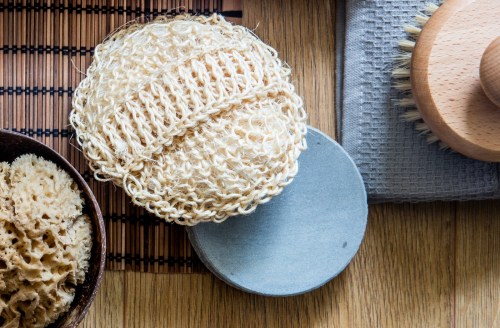Our editors independently select these products. Making a purchase through our links may earn Well+Good a commission
Clean or replace your loofah *this* often because it’s a straight-up bacteria playground
You use your shower scrubber to clean your body from head-to-toe, but if you're not replacing it or giving it a wash on the regular, you might be breeding more germs than you think. Here's how often to replace loofah in your bathroom, according to an expert.

Embarrassing, but true: I’ve lived in New York for about three years now, and I can count on one hand the times I’ve replaced my loofah. Like water filters and towels, the exfoliating shower sponges are one of those nasty microbe breeding grounds that hide in plain sight. That is, until you talk to a germ specialist who sheds light on your entire hygiene regimen (or at least the scrubbing part) being a lie.
Referencing a study from 2012, Jason Tetro, a microbiologist and author of The Germ Files, tells me that shower loofahs are virtually a utopia for all sorts of tiny critters. The reason, according to Tetro, is simple. “Remember, bacteria only need three things to grow: They need water, which they’re going to have lots of [in the shower]; they’re going to need food, which comes in the form of your skin, your oil, all the things that you’re scrubbing off; and they need a nice temperature in order to grow. And, of course, loofah sponges aren’t kept in freezers so they’re going to definitely grow,” he explains.
In just 10 short days, Tetro says the germs on your loofah get “really, really, really happy” and begin to grow at their maximum rate. If you continue to wash your skin with the microbe-ridden sponge, Tetro says you run the risk of catching skin diseases and other unwanted infections from bugs like Pseudomonas aeruginosa, which can result in skin irritations and pneumonia alike. A 1994 study even found that you may be spreading fecal matter from one part of your body to the next. (Eeek!)
In just 10 short days, germ expert Tetro says the germs on your loofah get “really, really, really happy” and begin to grow at their maximum rate. (Eeek!)
Even if you happen upon a super-fancy shower sponge that makes antibacterial and antimicrobial claims, Tetro argues it won’t will be much cleaner than the run-of-the-mill, pom-pom-looking variety you’ll find at your local pharmacy. “We already know from the FDA that the chemicals that they use to make sure that these are antimicrobial, like triclosan, are relatively ineffective,” Tetro says.
So whether you go for a drugstore-style fluorescent option or a fancier exfoliator, the germ expert says you have two options for cleaning up your sanitation routine: toss and replace your sponges on a weekly basis, or make a point of washing them at that same frequency until they literally fall apart. To do so, Tetro says to bring a pot of water to a boil, remove it from heat and then place the loofah inside, since bacteria dies at 160°F (and water boils at about 212°F). Leave the sponge submerged for one to three minutes and all the germs will be good as gone…for now.
Speaking of things you use for cleaning but can actually be *really* dirty, you’re going to want to wash your sponge and dish towel, stat.









